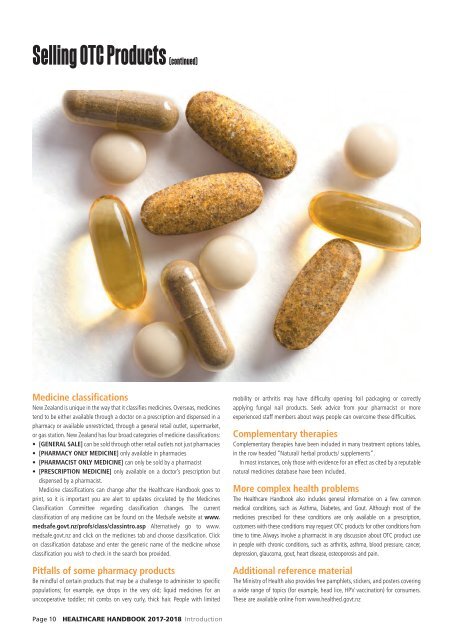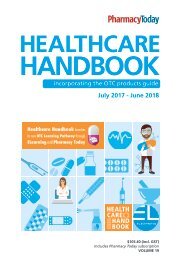2017 HCHB_digital
Create successful ePaper yourself
Turn your PDF publications into a flip-book with our unique Google optimized e-Paper software.
Selling OTC Products (continued)<br />
Medicine classifications<br />
New Zealand is unique in the way that it classifies medicines. Overseas, medicines<br />
tend to be either available through a doctor on a prescription and dispensed in a<br />
pharmacy or available unrestricted, through a general retail outlet, supermarket,<br />
or gas station. New Zealand has four broad categories of medicine classifications:<br />
• [GENERAL SALE] can be sold through other retail outlets not just pharmacies<br />
• [PHARMACY ONLY MEDICINE] only available in pharmacies<br />
• [PHARMACIST ONLY MEDICINE] can only be sold by a pharmacist<br />
• [PRESCRIPTION MEDICINE] only available on a doctor’s prescription but<br />
dispensed by a pharmacist.<br />
Medicine classifications can change after the Healthcare Handbook goes to<br />
print, so it is important you are alert to updates circulated by the Medicines<br />
Classification Committee regarding classification changes. The current<br />
classification of any medicine can be found on the Medsafe website at www.<br />
medsafe.govt.nz/profs/class/classintro.asp Alternatively go to www.<br />
medsafe.govt.nz and click on the medicines tab and choose classification. Click<br />
on classification database and enter the generic name of the medicine whose<br />
classification you wish to check in the search box provided.<br />
Pitfalls of some pharmacy products<br />
Be mindful of certain products that may be a challenge to administer to specific<br />
populations; for example, eye drops in the very old; liquid medicines for an<br />
uncooperative toddler; nit combs on very curly, thick hair. People with limited<br />
mobility or arthritis may have difficulty opening foil packaging or correctly<br />
applying fungal nail products. Seek advice from your pharmacist or more<br />
experienced staff members about ways people can overcome these difficulties.<br />
Complementary therapies<br />
Complementary therapies have been included in many treatment options tables,<br />
in the row headed “Natural/ herbal products/ supplements”.<br />
In most instances, only those with evidence for an effect as cited by a reputable<br />
natural medicines database have been included.<br />
More complex health problems<br />
The Healthcare Handbook also includes general information on a few common<br />
medical conditions, such as Asthma, Diabetes, and Gout. Although most of the<br />
medicines prescribed for these conditions are only available on a prescription,<br />
customers with these conditions may request OTC products for other conditions from<br />
time to time. Always involve a pharmacist in any discussion about OTC product use<br />
in people with chronic conditions, such as arthritis, asthma, blood pressure, cancer,<br />
depression, glaucoma, gout, heart disease, osteoporosis and pain.<br />
Additional reference material<br />
The Ministry of Health also provides free pamphlets, stickers, and posters covering<br />
a wide range of topics (for example, head lice, HPV vaccination) for consumers.<br />
These are available online from www.healthed.govt.nz<br />
Page 10 HEALTHCARE HANDBOOK <strong>2017</strong>-2018 Introduction



